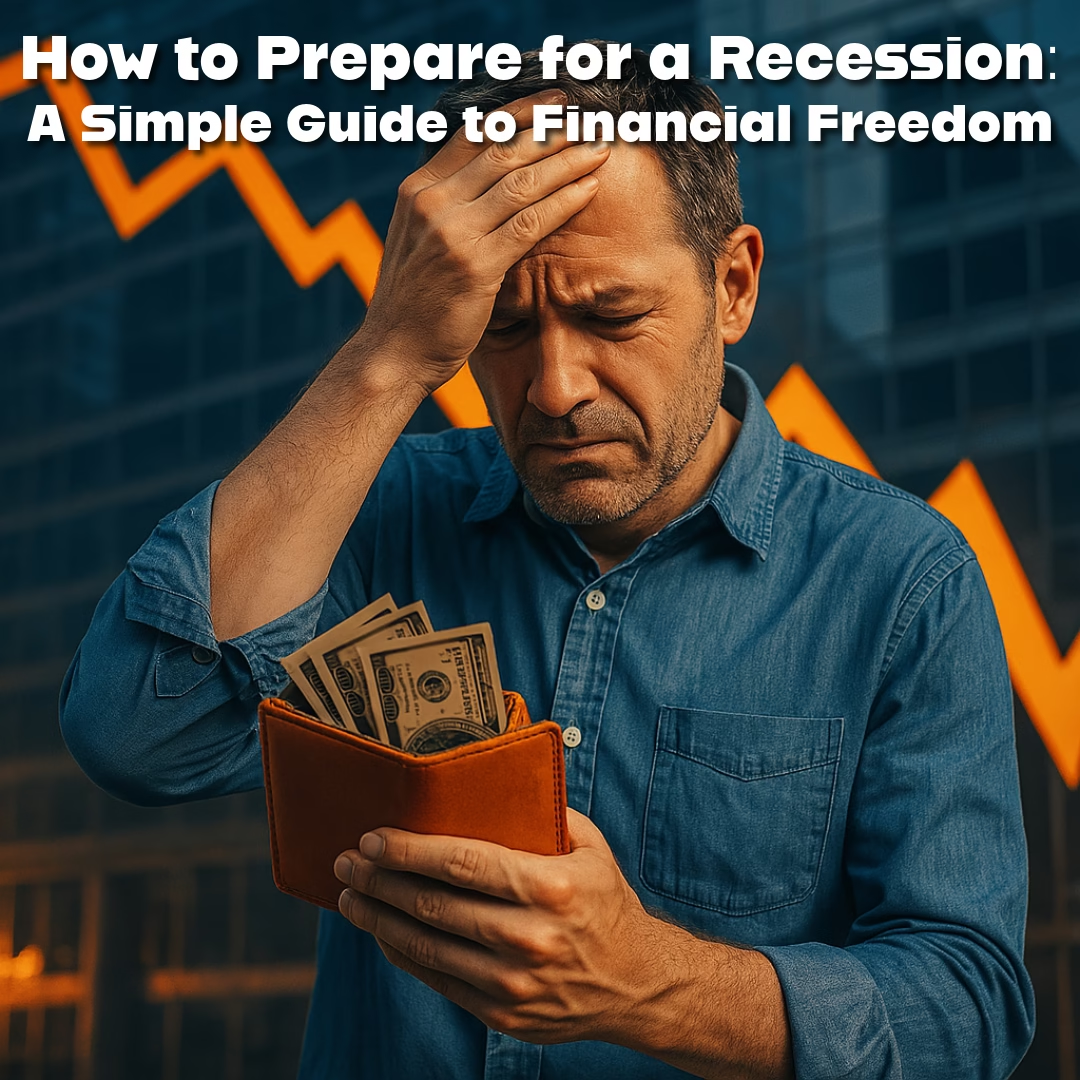Have you thought about how to prepare for a recession? Are you worried about a coming recession? You’re not alone. Many people working hard to gain financial freedom feel unsure when the economy looks shaky. But here’s the good news: With a few smart, simple steps, you can protect your finances and keep moving toward your goals—even during tough times.
1. Don’t Panic— Prepare for a Recession by Staying Focused on the Long Game
When you hear the word recession, it’s easy to feel anxious. But the most important thing to remember is don’t panic. Economic downturns are a normal part of the cycle—they come and go.
What to Do:
- Stay calm: Avoid making emotional decisions like pulling all your money out of the stock market. If your investments are in a retirement account like a 401(k) or Roth IRA and are aligned with your long-term goals, it’s usually best to leave them alone.
- Stick to your plan: If you’ve created a budget, sinking funds, or an investment strategy, don’t throw it out because of scary headlines.
- Ignore the noise: Limit how much economic news you consume. Maybe check updates once a week instead of every day.
2. Cut Back on Discretionary Spending
Discretionary spending means the things you want but don’t necessarily need. Think: eating out, streaming services, online shopping, new clothes for fun—not function.
Simple Tricks:
- Try a “no-spend challenge” for a weekend or even a whole month. Only buy what’s essential.
- Cut back on subscriptions using tools like Trim or Rocket Money to cancel unused services automatically.
- Switch to free entertainment: Local parks, libraries, free museum days, and YouTube workouts are great budget-friendly options.
Example: If you eat out 3 times a week, cut back to once. If you save $20 each time, that’s $160/month saved!
3. Prepare for a Recssion by Focusing on Paying Down Debt—Especially Credit Cards
During a recession, jobs can become unstable and interest rates can go up. That makes carrying high-interest debt—especially credit card debt—even more dangerous.
How To Tackle Debt:
- Use the debt snowball or avalanche method. Snowball means pay off smallest debts first for motivation. Avalanche means pay off the highest-interest ones first to save more money.
- Consider a balance transfer card with 0% interest for 12–18 months (only if you have the discipline to pay it off before interest kicks in).
- Set up automatic payments to avoid late fees.
Example: If you have $5,000 in credit card debt at 25% APR, that could cost you over $1,200 in interest per year if you only pay the minimum!
4. Build or Boost Your Emergency Fund to Prepare for a Recession
This is your financial safety net. If you lose your job or face an unexpected expense (like car repairs or medical bills), an emergency fund keeps you from turning to credit cards or loans.
Smart Ways to Build One:
- Start small: Aim for $500, then $1,000, and build from there.
- Automate your savings with a tool like Chime or Ally Bank that lets you “round up” purchases or schedule weekly deposits.
- Use a high-yield savings account like those from SoFi or Marcus by Goldman Sachs to earn a better interest rate.
Pro Tip: Keep your emergency fund separate from your regular spending account, so you’re not tempted to dip into it.
5. Embrace the ‘Underconsumption Core’ Mindset
The underconsumption core is all about living below your means—not just for frugality’s sake, but to gain time, freedom, and peace of mind. This mindset is becoming more popular among people who want simple finance and true independence from financial stress.
How To Apply This in Real Life:
- Ask “Do I really need this?” before every purchase.
- Borrow instead of buy—especially for tools, books, or one-time-use items. Check your local library or Buy Nothing group.
- Choose quality over quantity—one durable item is better than three cheap ones.
Example: Instead of replacing your phone every year, wait 3–4 years. That alone could save you thousands over a decade.
6. Invest in Yourself
Recessions don’t just bring risk—they also bring opportunity. One of the best ways to protect yourself is to improve your skills or learn new ones so you stay valuable in any job market.
Affordable Ways To Level Up:
- Use free or low-cost platforms like Coursera, edX, or Google Career Certificates.
- Get certifications in growing fields like IT, project management, or digital marketing.
- Learn personal finance skills (budgeting, investing, taxes) to better manage your own money.
Example: Learning Excel or basic coding could open the door to higher-paying roles, even if you’re not in tech.
7. Prepare for a Recession by Staying Flexible and Continuous Learning
Finally, flexibility is key. The economy is unpredictable, but if you stay adaptable and informed, you’ll be ready for whatever comes.
Tips for Staying Resilient:
- Review your budget monthly to spot areas to adjust.
- Have a side hustle or backup income plan. Consider driving for Uber, selling crafts on Etsy, or freelancing on Fiverr.
- Keep learning about simple finance, investing, and money management through podcasts, books, or websites like SimpleFinanceBytes!
Bottom Line
A recession doesn’t have to derail your financial journey. In fact, it can be a chance to double down on your financial freedom goals, simplify your spending, and grow stronger for the long haul. But you must prepare for a recession if you want to survive it with less stress.
By staying calm, cutting waste, building savings, and adopting the underconsumption core mindset, you’ll not only survive economic challenges—you’ll thrive through them.
Want more simple finance tips delivered straight to your inbox? Subscribe to our newsletter and stay on the path to financial freedom, one smart step at a time.
